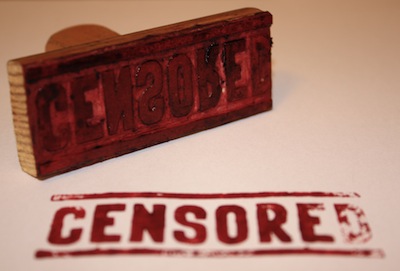
Censorship of Violence in the Media

“Submitting to censorship is to enter the seductive world of 'The Giver': the world where there are no bad words and no bad deeds. But it is also the world where choice has been taken away and reality distorted. And that is the most dangerous world of all.”—Lois Lowry
“Vietnam was the first war ever fought without any censorship. Without censorship, things can get terribly confused in the public mind.”—William Westmoreland
“The one thing you learn over the years with broadcast standards is there's no such thing as broadcast standards. The standard is anything you can get them to let you do.”— producer Steven Bochco [Hollywood Reporter, 8/23/02]
“An actor cannot be a censor. I'm there to interpret.”—Malcolm McDowell
“"Sometimes I get asked, 'Do you feel responsible about what you put out lyrically?' or 'What are your thoughts on censorship?' I've always said, based on my own head, 'Give people the benefit of the doubt. Give them credit to think for themselves.' Nobody has the right to say, 'Hey, I'm telling you what you can and cannot see, because I know better than you.' That's ridiculous. I feel, 'Yeah, empower the individual.' And then you turn on the news and you see some new idiot who kills kids in a church, and my argument goes out the window. It's troubling”—Trent Reznor of Nine Inch Nails (Rolling Stone, Jan 2000).
Censorship is essentially an issue of responsibility. Are we responsible for processing and filtering the images that we see and the lyrics we hear, or is someone else (parents or government) responsible for processing and filtering for us? Should the creators of media texts censor themselves, and take responsibility for the effects their texts may have on an individual? If there are going to be legal restrictions on the depiction of violence, who writes and enforces them?
These are difficult questions, and they have been debated for centuries. There's a broad consensus that some censorship is necessary — although in the Internet age it may be impossible to enforce. Most people would agree that not all media texts are suitable for all audiences. It is generally agreed that there need to be some limitations placed on the type and content of texts which young children are exposed to, for instance. It is also agreed that the texts which are accessible to a wide and largely involuntary or non-selecting audience (billboards, television commercials, music broadcast on the radio, terrestrial TV before the watershed) should not contain elements which might be offensive. Therefore, rules and regulations and systems have been set up to filter the content of certain media texts in certain situations. This is the practice of censorship.
- Go to Censorship of Movies
- Go to Censorship of Television
- Go to Censorship of Popular Music
Freedom of Speech
However, most would also agree (including the writers of the US constitution) that Freedom Of Speech is a basic human right, and that this should not be eroded or compromised through censorship in a nation which likes to call itself free. Film-makers, poets, musicians, graffiti artists, internet site creators and journalists should have the right to say what they think, without fear of censure, from official authorities or elsewhere.
- Index On Censorship - magazine dealing with Free Speech issues from around the world.
- Freedom Forum - A roundup of news relating to Freedom of Speech (particularly First Amendment issues in the US)
- Electronic Frontier Foundation - Defending Freedom In The Digital World
- Feminists Against Censorship
There is an ongoing debate about those who believe in the need for censorship (parents, governments, politicians) and those who believe in absolute freedom of speech (artists, media corporations, teenage audiences). This debate rages across all forms of the media and looks never to be resolved until effects theories can be finally and absolutely proven. In court. It boils down to issues of responsibility - as individuals, are we responsible enough to interpret and screen our unique media experience and make sure that we are not unduly influenced by it, or does society need to take that responsibility for us?
You need to familiarise yourself with the different methods of censorship used by different media, and with the particular issues surrounding texts in that form. Also, check out some of the anti-censorship sites, like Melonfarmers - those who censor the censors!